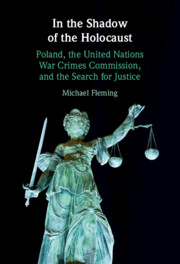 In the Shadow of the Holocaust
In the Shadow of the Holocaust Book contents
- In the Shadow of the Holocaust
- In the Shadow of the Holocaust
- Copyright page
- Contents
- Acknowledgements
- Abbreviations
- Introduction
- 1 Invasion and Occupation
- 2 Seeking a Response
- 3 Polish Soft Diplomacy
- 4 War Crimes and the Path towards the UNWCC
- 5 The UNWCC, Law, and Inter-Allied Politics
- 6 The Polish Government in Exile’s War Crimes Office
- 7 Pursuing Justice across the Iron Curtain
- 8 Poland, the UNWCC, and the Cold War
- Conclusion
- Bibliography
- Index
5 - The UNWCC, Law, and Inter-Allied Politics
Published online by Cambridge University Press: 23 December 2021
- In the Shadow of the Holocaust
- In the Shadow of the Holocaust
- Copyright page
- Contents
- Acknowledgements
- Abbreviations
- Introduction
- 1 Invasion and Occupation
- 2 Seeking a Response
- 3 Polish Soft Diplomacy
- 4 War Crimes and the Path towards the UNWCC
- 5 The UNWCC, Law, and Inter-Allied Politics
- 6 The Polish Government in Exile’s War Crimes Office
- 7 Pursuing Justice across the Iron Curtain
- 8 Poland, the UNWCC, and the Cold War
- Conclusion
- Bibliography
- Index
Summary
The chapter focuses on the development of the UNWCC from its founding in late 1943 to the summer of 1945. It analyses its position at the nexus of inter-Allied debates on war crimes and demands for post-war justice. The chapter considers the flow of legal ideas through the organisation, and how those ideas, Allied inter-relations and knowledge of war crimes encouraged several representatives at the UNWCC to adopt a more expansive conception of the organisation’s role than that initially conceived by the British Foreign Office.
- Type
- Chapter
- Information
- In the Shadow of the HolocaustPoland, the United Nations War Crimes Commission, and the Search for Justice, pp. 144 - 171Publisher: Cambridge University PressPrint publication year: 2022
